
Leisel Marie Jones, OAM is an Australian former competition swimmer and Olympic gold medallist. A participant in the 2000 Summer Olympics – at just 15 years old – and 2004 Summer Olympics, she was part of gold-medal-winning Australian team in the women's 4×100-metre medley relay at the Athens Games in 2004 and a gold medallist for 100-metre breaststroke in the 2008 Summer Olympics in Beijing.
Adrian David Moorhouse MBE is an English former competitive swimmer who dominated British swimming in the late 1980s. He won the gold medal in the 100-metre breaststroke at the 1988 Summer Olympics in Seoul, Korea. Since then Moorhouse, a former pupil of Bradford Grammar School, has translated his sporting success to a successful career in the business world, as managing director of Lane4, a consultancy helping individuals and teams around the world reach their fullest potential.
Nicholas Gillingham, is an English former competitive swimmer, active in the 1980's and 1990's. Born in Walsall, he represented Great Britain in the Olympics, FINA World championships and European championships, as well as representing England in the Commonwealth Games. Medalling in two Olympic Games in 1988 and 1992, he was a World, European and Commonwealth champion in his specialist event, the 200 metres breaststroke. His career broadly overlapped with fellow British breaststroker and Olympic 100 metre breaststroke champion, Adrian Moorhouse.

The men's 200 metre freestyle event at the 1976 Summer Olympics took place on July 19 at the Olympic Pool, Montreal. There were 55 competitors from 33 nations, with each nation having up to three swimmers. The medals were swept the United States, the only time there has been a medal sweep in the men's 200 metre freestyle. Bruce Furniss took gold, John Naber silver, and Jim Montgomery bronze. It was the second consecutive and third overall victory by an American swimmer.

Terrence Stephen Gathercole, was an Australian breaststroke swimmer of the 1950s and 1960s, who won a silver medal in the 4x100-metre medley relay at the 1960 Summer Olympics. He later became a swimming coach, at one stage being the Australian female team coach for the 1964 Summer Olympics and guiding numerous breaststroke students to Olympic and World Championship gold medals. He also served as the president of Swimming Australia.
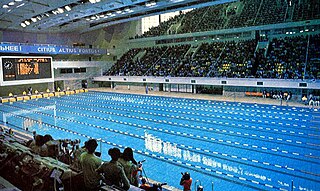
The men's 200 metre freestyle event at the 1980 Summer Olympics was held on 21 July at the Swimming Pool at the Olimpiysky Sports Complex. There were 42 competitors from 24 nations, with each nation having up to three swimmers. The event was won by Sergey Koplyakov of the Soviet Union, with his countryman Andrey Krylov finishing second. The medals were the first for the Soviet Union in the men's 200 metre freestyle. Graeme Brewer of Australia won that nation's first medal in the event since 1968 with his bronze.

Christian David Sprenger is an Australian former breaststroke swimmer. He trains at the Commercial Swimming Club under Simon Cusack.
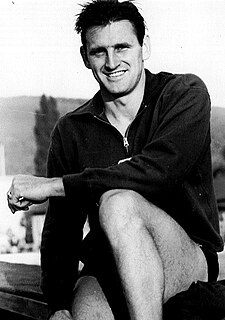
The men's 100 metre freestyle event at the 1948 Olympic Games took place between 30 and 31 July at the Empire Pool. There were 41 competitors from 19 nations. Nations had been limited to three swimmers each since the 1924 Games. The event was won by Wally Ris, returning the United States to the podium in the event after a one-Games absence broke a seven-Games streak. It was the sixth victory for an American in the 100 metre freestyle, most of any nation. Another American, Alan Ford, took silver. Géza Kádas of Hungary earned bronze, the nation's third medal in four Games. Japan's three-Games medal streak in the event ended with no Japanese swimmers competing due to the nation not being invited after World War II.
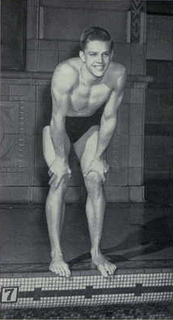
Robert Raymond Sohl was an American competition swimmer and Olympic medalist.

The women's 200 metre breaststroke event, included in the swimming competition at the 1948 Summer Olympics, took place from 30 July to 3 August at the Empire Pool. In this event, swimmers covered four lengths of the 50-metre (160 ft) Olympic-sized pool employing the breaststroke. It was the fifth appearance of the event, which first appeared at the 1924 Summer Olympics in Paris. It was also the first appearance of the event since the outbreak of World War II. A total of 22 competitors from 14 nations participated in the event.

The men's 100 metre freestyle event at the 1952 Summer Olympics took place between 26 and 27 July at the Helsinki Swimming Stadium. There were 61 competitors from 33 nations. Nations had been limited to three swimmers each since the 1924 Games. The event was won by Clarke Scholes of the United States, the nation's second consecutive and seventh overall victory in the men's 100 metre freestyle. Japan, absent from the 1948 Games after World War II, returned to the podium in the event with Hiroshi Suzuki's silver. Göran Larsson earned Sweden's first medal in the event since 1908 with his bronze.
The men's 200 metre breaststroke event at the 1952 Olympic Games took place between 31 July and 2 August at the Swimming Stadium. This swimming event used the breaststroke. Because an Olympic size swimming pool is 50 metres long, this race consisted of four lengths of the pool.

The men's 100 metre freestyle event at the 1956 Olympic Games took place between 29 and 30 November. There were 34 competitors from 19 nations. Nations had been limited to three swimmers each since the 1924 Games. The event was won by Jon Henricks of Australia, the nation's first medal in the event. Australia would win a second 0.4 seconds later and a third 0.9 seconds after that, sweeping the podium—the first sweep in the men's 100 metre freestyle since the United States did it in 1920 and 1924, and the first sweep of any event by Australian competitors. This year, the Americans finished fourth through sixth. It was the first time since 1924 that Japan had competed but not medaled.
The men's 200 metre breaststroke event at the 1964 Summer Olympics took place between October 13 and October 15. This swimming event used the breaststroke. Because an Olympic-size swimming pool is 50 metres long, this race consisted of four lengths of the pool.

The women's 200 metre breaststroke event, included in the swimming competition at the 1964 Summer Olympics, took place on 11–12 October, at the Yoyogi National Gymnasium. In this event, swimmers covered four lengths of the 50-metre (160 ft) Olympic-sized pool employing the breaststroke. It was the ninth appearance of the event, which first appeared at the 1924 Summer Olympics in Paris. A total of 27 competitors from 15 nations participated in the event. Soviet Union's Galina Prozumenshchikova and Svetlana Babanina won their country's first ever medals in this event, with a gold and bronze medal respectively. Claudia Kolb's silver medal was the United States' second ever medal in this event, after Agnes Geraghty's silver in the inaugural event in 1924. In the heats, Australian Christine Barnetson was disqualified for an incorrect breaststroke, and Hungarian Márta Egerváry withdrew from the competition.
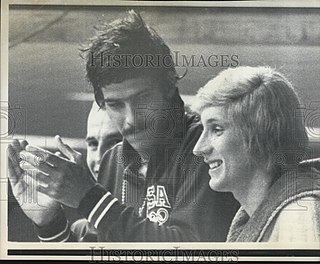
The men's 200 metre freestyle event at the 1972 Summer Olympics took place on August 29 at the Olympia Schwimmhalle. There were 46 competitors from 27 nations, with each nation having up to three swimmers. The event was won by Mark Spitz of the United States, the nation's second victory in the event. It was the third gold medal for Spitz in 1972, halfway to his goal of six. His teammate Steve Genter took silver, with Werner Lampe of West Germany earning bronze. Defending champion Michael Wenden of Australia finished fourth.
The men's 200 metre breaststroke event at the 1972 Olympic Games took place September 2. This swimming event used the breaststroke. Because an Olympic-size swimming pool is 50 metres long, this race consisted of four lengths of the pool.

The swimming competitions at the 2012 Summer Olympics in London took place from 28 July to 4 August at the Aquatics Centre. The open-water competition took place from 9 to 10 August in Hyde Park.
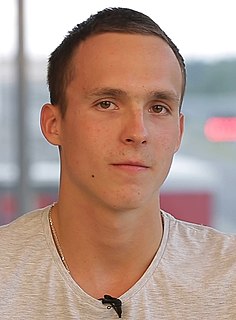
Anton Mikhailovich Chupkov is a Russian competitive swimmer. He is the European record holder in the long course 200 metre breaststroke and the Russian record holder in the long course 100 metre breaststroke. He formerly held the world record in the long course 200 metre breaststroke. At the 2015 European Games he won four gold medals in individual and relay events. He won the bronze medal in the 200 metre breaststroke at the 2016 Summer Olympics. He won the gold medal in the 200 metre breaststroke at the 2017 and 2019 World Aquatics Championships.

Brandon Schuster is a Samoan swimmer who represented Samoa at the 2016 Summer Olympics. He holds multiple Samoan records in swimming.















